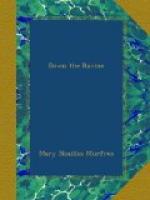Tennessee, overpowered by disappointment, sobbed herself to sleep upon the floor, and then ensued an interval of quiet. Rufe, a towheaded boy of ten, dressed in an unbleached cotton shirt and blue-checked homespun trousers, concluded that this moment was the accepted time to count the balls in his brother’s shot-pouch. This he proceeded to do, with the aid of the sullen glare from the embers within and the fluctuating gleams of the lightning without. There was no pretense of utility in Rufe’s performance; only the love of handling lead could explain it.
“Ye hed better mind,” his mother admonished him. “Birt war powerful tried the t’other day ter think what hed gone with his bullets. He’ll nose ye out afore long.”
“They hev got sech a fool way o’ slippin’ through the chinks in the floor,” said the boy in exasperation. “I never seen the beat! An’ thar’s no gittin’ them out, nuther. I snaked under the house yestiddy an’ sarched, an’ sarched!—an’ I never fund but two. An’ Towse, he dragged hisself under thar, too—jes’ a-growlin’ an’ a-snappin’. I thought fur sartin every minit he’d bite my foot off.”
He resumed his self-imposed task of counting the rifle balls, and now and then a sharp click told that another was consigned to that limbo guarded by Towse. Mrs. Dicey stood in silence for a time, gazing upon the unutterably gloomy forest, the distant, throbbing stars, and the broad, wan flashes at long intervals gleaming through the sky.
“It puts me in a mighty tucker ter hev yer brother a-settin’ out through the woods this hyar way, an’ a-leavin’ of we-uns hyar, all by ourselves sech a dark night. I’m always afeared thar mought be a bar a-prowlin’ round. An’ the cornfield air close ter the house, too.”
“Pete Thompson—him ez war yander ter the tanyard day ’fore yestiddy with his dad,” said the boy, “he tole it ter me ez how he seen a bar las’ Wednesday a-climbin’ over the fence ter thar cornfield, with a haffen dozen roastin’-ears under his arm an’ a watermillion on his head. But war it a haffen dozen? I furgits now ef Pete said it war a haffen dozen or nine ears of corn the bar hed;” and he paused to reflect in the midst of his important occupation.
“I’ll be bound Pete never stopped ter count ’em,” said Mrs. Dicey. “Pick that chile up an’ come in. I’m goin’ ter bar up the door.”
Birt Dicey plodded away through the deep woods and the dense darkness down the ravine. Although he could not now distinguish one stone from another, he had an uncontrollable impulse to visit again the treasure he had discovered. The murmur of the gently bubbling water warned him of the proximity of the deep salt spring almost at the base of the mountain, and, guiding himself partly by the sound, he made his way along the slope to the great bowlder beneath the cliffs that served to mark the spot. As he laid his hand on the bowlder, he experienced




